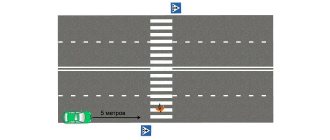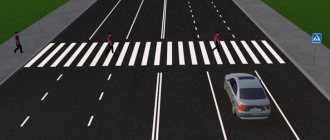It is prohibited to place vehicles in areas occupied by green spaces.
This article exists and operates specifically in Moscow, providing for increased fines compared to fines for the same violations in the rest of Russia.
Unlike the rest of the country, in the city of Moscow, for legal entities parking a vehicle on the lawn, a fine of 300,000 rubles is imposed, for individuals - 5,000 rubles. The difference is very significant, so if the car is registered to a legal entity, then there is a danger of receiving a fine of 300,000 rubles even if the car was not actually used as part of the company’s activities (for example, it was simply in the personal use of the general director, one of the employees and etc.). The concept of lawn in the law has been replaced by the wording “territory occupied by green spaces”; the legislator made this trick due to the fact that the lawn must have certain distinctive features, and given the fact that it is located in the city, it must be on the balance sheet of the city, behind it maintenance must be carried out, etc., in other words, this gave the lawyer extra room for maneuver in order to protect his client by proving that the lawn is not a lawn at all.
Article 8.25. Placing vehicles in areas occupied by green spaces. Placing vehicles on a lawn or other area occupied by green spaces - entails the imposition of an administrative fine on citizens in the amount of five thousand rubles; for officials - thirty thousand rubles; for legal entities - three hundred thousand rubles.
How to avoid a fine?
The best advice is to know your local laws regarding this offense. Acts in different cities contain different understandings of the lawn. Somewhere the presence of grass is mandatory, but not everywhere, for example, the designation of this area is required. So, if a person is sure that he is standing on bare ground without grass, bushes and fences, and he is still fined, it’s time to make sure whether this place is considered a lawn.
Speaking about the grass cover in the courtyards of apartment buildings, everything is not so simple here. Front gardens can be created due to the enthusiasm of the people living here. But this does not mean at all that the territory is officially considered a lawn.
Most local codes contain language only for parking and, at most, parking. In this case, it can be proven that there was only the fact of stopping, which is not prohibited by law. The main thing is that there are no witnesses to the prolonged presence of vehicles in the prohibited area and no video cameras. Although a stop is considered a stop, which is already grounds for imposing a fine.
The most risky option is to try to prove that parking was carried out as a result of force majeure (prevention of an accident, a sharp deterioration in health, etc.). Such cases exclude or minimize punishment. But cameras on nearby houses or a doctor’s examination will quickly reveal the deception, and then a fine cannot be avoided.
We suggest you familiarize yourself with: Kbk transport tax fine
Thus, the best option to prove your innocence is to prove that the parking area is not a lawn. Only this guarantees in most cases the cancellation of the fine.
Where to appeal legal. face a fine for parking on the lawn?
You can appeal the fine directly to the body that issued the controversial decision to bring the legal entity to administrative liability - to MADI. A substantiated complaint accompanied by documents as evidence must be sent to MADI by registered mail. In practice, this is a waste of time, the chances of success are approximately zero. We recommend skipping this step.
The correct decision would be to appeal the fine immediately in court! A complaint against a decision to prosecute someone for parking a car on a lawn must be sent to the court that serves the address where the violation was committed. You will find the address at which the parking was recorded in the resolution that you received from MADI, and the court is determined on the website of the Moscow City Court (on the website https://www.mos-gorsud.ru section “territorial jurisdiction”).
A few of our cancellations in the courts
Decision to cancel the fine Kuzminsky court
Decision to cancel the fine Lublin court
Decision to cancel the fine Kuntsevo court
Decision to cancel the fine Nikulinsky court
In what cases is punishment applied?
If the owner of a car violates traffic rules, parking on the lawn becomes the basis for prosecution by a traffic police officer. Along with this, the imposition of penalties can also be carried out on the initiative of the city or village administration, this is especially true if the motorist left the car on the lawn in the courtyard of an apartment building.
The grounds for prosecution may be:
- the fact that the vehicle is currently located in a prohibited place;
- a complaint from the management company of an apartment building (when parking on the lawn in the yard);
- provision of information and evidence of offenses by citizens, public organizations, and the media.
This is interesting. Video and photographic materials can be used as evidence when filing a complaint.
What are the deadlines for appealing a MADI decision?
The period for appealing a fine imposed on a legal entity is 10 days from the date of receipt of the decision. Please note that the deadline does NOT start from the date when the violation itself occurred (the driver parked the car on the lawn), but namely from the date when the legal entity. the person received a ruling. Decrees come from MADI by registered mail with tracking numbers; accordingly, the date of receipt of the resolution will be visible on the Russian Post website and this information can be verified very simply. A little more about the countdown of the deadline for appealing the MADI decision under Art. 8.25 Code of Administrative Offenses:
- upon receipt at the post office, 10 days are counted from the day you received the letter
- when applying in person to MADI, the period is counted from the date of personal delivery
- if the storage period for the letter at the post office has expired and it has gone back to MADI, then 10 days are calculated from the last day the letter was stored at the post office
If you find a fine for parking on the lawn in an application, on a website, etc., then we strongly do not recommend waiting for the decision by mail. Letters in the mail sometimes get lost, simply disappear without a trace, are handed to the wrong people, MADI makes a mistake in the recipient's address and a million other reasons. Explaining later in court that the letter was lost somewhere in the mail and the deadline was missed for a good reason is not the most pleasant experience and does not always end in success. Don’t risk 300,000 rubles - you urgently need to go to MADI and get a resolution on purpose!
MADI address: Moscow, st. Kalanchevskaya, 49 (metro station Komsomolskaya, 10 min walk)
If this deadline is missed, then this is of course not good and complicates the procedure, but is not an insurmountable obstacle. The period for appeal is restored in court simultaneously with the consideration of the case on the merits; in practice, Moscow courts do not interfere with the restoration of the period.
Loshakov Sergey
Leading lawyer of the bar
Sergey Valerievich is an active lawyer of the Moscow Bar Association with extensive judicial practice and extensive experience. Fill out the application in the feedback form and receive a free initial consultation with a specialist.
Punishment
The penalty for all regions of the Russian Federation is the application of the general norm of the Code of Administrative Offenses, according to which it is expressed in the payment of a minimum fine of 500 rubles. Regional legislation adopted and in force in a certain administrative district can significantly increase this amount and be expressed in the following amounts:
- in Moscow there is a fine of 300,000 for parking on the lawn for legal entities. Individuals will pay 5,000 rubles. The peculiarity of the accrual of penalties in this region is that it can be issued by MADI inspectors, and the violation itself is recorded using the information provided by the Mobile Inspector system;
- in St. Petersburg, the authorities fine the amount of 2,500 rubles or from 4,000 to 5,000 for individuals - in this situation, the amount of the penalty will depend on what violation the driver’s actions are classified as. Legal entities in this region are fined up to 100,000 rubles;
- in Ryazan physical. individuals will have to pay from 500 to 2000 rubles, and legal entities from 5000 to 20000;
- for Novgorod, the fine is set at a value from 2000 to 4000 for individuals. persons and from 30,000 to 60,000 rub. for organizations.
Important information. In addition to the fine assessed, the motorist may be forced to pay an additional amount. It will be determined based on the need to restore the original condition of the site that was damaged by the motorist.
What should I send to court and how quickly can I cancel a fine for parking on the lawn?
After the court has been determined, which, according to its territorial jurisdiction, has jurisdiction over the case, and the deadline for appeal has not been missed (if missed, an additional petition is drawn up to restore the missed deadline), the next step is to file a complaint against the decision in the case of an administrative offense under Art. 8.25 Code of Administrative Offenses of Moscow. The requirements for the complaint itself are established by the Code of Administrative Offenses of the Russian Federation and there are quite a lot of them; it is impossible to briefly talk about them all. It is important to know that such a complaint can be signed either by the director of the organization, or by a representative under a power of attorney, or by a lawyer under a warrant; documents confirming authority (power of attorney) must be attached to the complaint. The period for consideration of the complaint itself in court is established by the code and is “no more than 2 months”, in other words, from the moment the court accepts the complaint, a decision can be made in a week, or maybe in 6 weeks, but not more than 2 months. While the decision to attract a legal entity for parking on the lawn is being appealed, it has no legal force, which means that it is impossible to apply any collection measures (blocking the account, writing off funds from the organization’s current account, etc.). The most important thing in a complaint is evidence. The most reliable way to change the penalty from 300,000 rubles to 5,000 rubles is to prove in court that a violation of parking rules (parking on the lawn) was committed by an individual who, for example, rented a car from an LLC (PJSC, etc.) and it should bear responsibility. A less obvious method, but used if it is impossible to follow the simple path described above, is to search for procedural violations in the process of bringing a legal entity to administrative responsibility. The Code of Administrative Offenses of the Russian Federation contains a lot of requirements for the procedure for attracting (the right to a defense, the right to participate in the consideration of a case of an administrative offense, the right to draw up a protocol on the violation in the presence of a legal entity, etc.), quite often it turns out to find a formal violation of the Code and declare the resolution illegal on these grounds.
What does an absurd fine look like?
In the presented photo, you can see a real fine under 8.25 Code of Administrative Offenses, for which a legal entity almost had to pay three hundred thousand rubles!
If you look closely, you will notice that in fact the car’s wheels are standing on the very edge of the paved area! Only its front part, the bumper, hangs over the lawn. This photo was taken in such a way that it is difficult to notice, but at the request of the court, the original was obtained in high resolution, after which all questions disappeared by themselves.
In our practice, this is not an isolated case. It happened more than once that the car was parked on the side of the road, and the fine came for parking on the lawn. In one of our cases, the car was parked on a dirt driveway to a construction site and was being unloaded - even in such an absurd situation, MADI attracted the owner of the vehicle under Art. 8.25 ZGM 45.
PS The fine was canceled by the decision of the Preobrazhensky District Court of Moscow dated March 10, 2021, case No. 12-0424/2021.
The essence of the violation
Why is a large number of legal proceedings often initiated regarding the traffic police fine for parking on the lawn, and is it actually possible to challenge the penalty imposed on the driver?
For reference. The traffic rules do not contain a definition of the word “lawn”; therefore, in the process of bringing a motorist to justice, the punishment itself can be challenged by the guilty person.
Turning to the regulatory documentation, it is impossible to find a clear definition that can be used when determining whether a site belongs to a lawn. In this case, the common expression “trimmed perennial or ornamental grass” cannot be taken into account, since it is contained only in the encyclopedia, which has no legal force.
Separate regulations adopted in different regions of the Russian Federation define the following areas as a lawn:
- areas that separate the sidewalk from the roads;
- that area that is located separately from the sidewalk and is overgrown with grass;
- artificially and naturally created green spaces;
- verges overgrown with grass.
What procedural violations are often committed by MADI under Art. 8.25 ZGM 45?
Procedural violations when bringing to administrative responsibility are quite common and can often be decisive in court, since violation of the procedure for bringing to responsibility established by law violates the rights of the person brought to account and entails the unconditional cancellation of the fine. According to the current legislation, a citizen (legal entity, individual entrepreneur, etc.) is given the right to protection, which he has the right to exercise, including at the time of drawing up a protocol on an administrative offense, i.e. be present during its preparation, submit petitions, challenges, present evidence, etc. This rule of law does not apply only to violations recorded using automatic violation recording systems (for example, road cameras) - i.e. special certified technical means for automatically recording violations, and calling the offender to draw up a protocol is not necessary only in this case. However, most protocols under Art. 8.25 of the Code of Administrative Offenses of Moscow is drawn up after complaints from “initiative” citizens who record violations on the camera of their mobile phone and send them to the PAK PM application (Software and hardware complex “Moscow Assistant”).
“PAK PM” (Software and hardware complex “Moscow Assistant”) and a citizen’s mobile phone are not a special certified technical means of automatically recording offenses!
From the above, it should be concluded that when you immediately receive a ready-made resolution with a fine, but you were not called to draw up a protocol on an administrative offense at MADI, the procedure for bringing to administrative responsibility was violated, and you are deprived of the right to defense. To prove this fact, it is necessary to file a corresponding petition in court to request the materials of the administrative case from MADI (the court itself will not request anything on its own initiative). From the materials received at the request, it will be clear that the protocol was drawn up in the absence of the person involved; there are no summonses in the material to draw up a protocol. Practice shows that this method of defense works well in Moscow courts.
Who fixes parking on the lawn?
Usually this is an active citizen with a phone, but sometimes it happens like in the photo above.
What will happen after the court decision and the cancellation of the fine for parking on the lawn in relation to a legal entity?
After the court cancels the decision to hold your company administratively liable, the court will send its decision to MADI (you can receive it on purpose and duplicate the sending in person) and then the individual will be held accountable, with a fine of 5,000 rubles (although this also happens not always, there are cases when MADI misses the deadline for bringing to justice and then the case ends without a fine). If the bailiffs have already initiated enforcement proceedings against your company, then it is subject to termination; if they managed to write something off from the organization’s current account, then this money will be returned to you.
Instructions
If the driver does not find the car at the site, then he should:
- Call the local traffic police and find out about the location of the car.
- Appear at the traffic police and receive a protocol, a resolution, and express disagreement with the resolution in writing.
- Send a complaint to an official within 10 days after bringing a citizen to administrative responsibility.
- If you receive a refusal, prepare a complaint to court.
- Challenge the decision of the courts in the regional court and the Supreme Court of the Russian Federation.
Experts admit that it is often much easier to pay a fine than to spend money on administrative and judicial litigation. In a difficult situation, it is also advisable to enlist the support of a qualified defense attorney.
Is there a fine for parking on the lawn in winter? Is there a fine? The answer is yes, there are and they are attracted.
MADI attracts for parking on the lawn in winter according to Art. 8.25 ZGM No. 45 is exactly the same as in the summer. Active citizens still continue to use the PAK-PM application and take photographs of cars parked where the lawn is not even visible, and legal entities and individuals receive fines of 300,000 rubles. and 5,000 rub. respectively. Formally, from a legal point of view, the authorized body explains such actions quite simply - just because the lawn is covered with snow and is not visible, it has not ceased to be a lawn, which means it is still impossible to place vehicles there. After the snow melts, the soil cover will be damaged in any case, which in the summer will negatively affect the already green plantings. When defending themselves in court, representatives of MADI literally say the following: “In winter, the lawn does not die, the root system does not go anywhere, it is alive and overwinters under the snow, and a 2-ton car, pushing through the snow cover with its weight, destroys it.”
Another question is how the court will react to the argument that since under a layer of snow it was impossible in principle to determine where the border of the roadway lies and the territory occupied by green spaces begins, then the driver should not be held responsible for such a violation, and in this case, for example, utilities are to blame services? The answer is that the court will react positively, this is a weighty argument and the chances of canceling this fine are greatly increased. The resolution itself on bringing to administrative responsibility from MADI always contains, on the front side, a photograph of the offense (black and white, of dubious quality), so it would not be amiss for the court to attach to it your good and color photograph of the place where the violation was committed, in which The absurdity of the situation will be much more visible. The photo must be taken from several angles with reference to the address - the nearest buildings with address signs (street, house number) should be visible in the photo.
To summarize the above, in winter people are attracted for parking on the lawn in exactly the same way as in summer. The difference is that when you go to court to appeal this fine, you have one more weighty argument in your arsenal than in the summer. The main thing is not to take the position of “there is no lawn there, there is snow there.” This position is incorrect. Subject to proof is the impossibility for the driver, due to circumstances beyond his control, to determine where the border of the roadway lies and the territory formally occupied by green spaces begins.
Have you finished reading the material and haven’t found the answer, do you have any more questions?
Leave a request or call and get a brief consultation with a lawyer!
Appeal against an illegally imposed fine
Of course, unfair punishment can and should be appealed.
There are only 10 days for this from the date of delivery of a copy of the resolution (Article 30.3 of the Code of Administrative Offenses of the Russian Federation). The most important thing is confidence in your rightness or the presence of a loophole in the law that you can take advantage of. An appeal of the traffic police decision is carried out to a higher official (in particular, the head of the inspector who issued the fine). No one has canceled the judicial appeal procedure. Although, as a rule, legal expenses are much higher than the amount of the fine. And litigation can drag on for several months. But if principle prevails, it is possible to seek such a resolution of the dispute.
The main source of dirt in a populated area is earth and soil, which are eroded and moved by car wheels onto the roadway. Local authorities can deal with violators by installing lawn barriers. But the problem is what is meant by a lawn and how should a driver act if there are no signs prohibiting parking, and a lawn as such does not exist.
The fine can be 3-5 thousand rubles. The driver should fight if he is sure that he left the car in an authorized place, for example, on the edge of a road overgrown with grass or fenced with an artificial obstacle that was not installed in a technical way. You can challenge the fine through administrative and judicial means.











